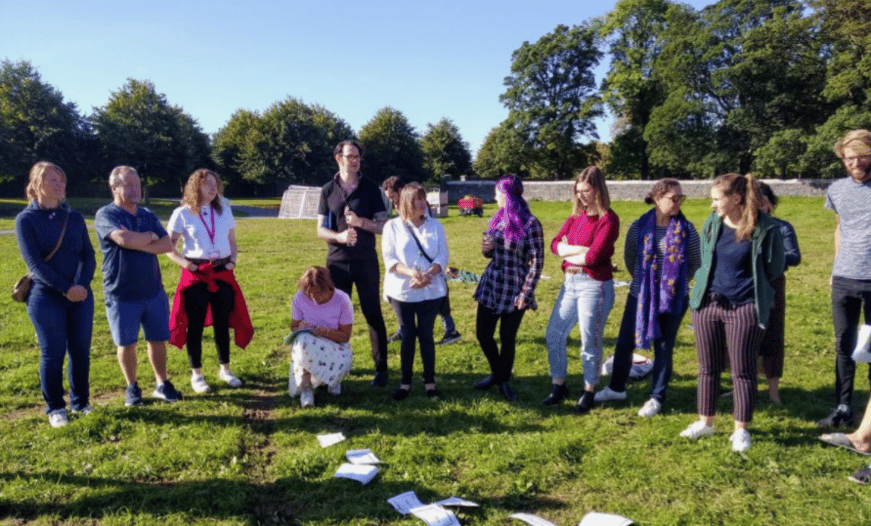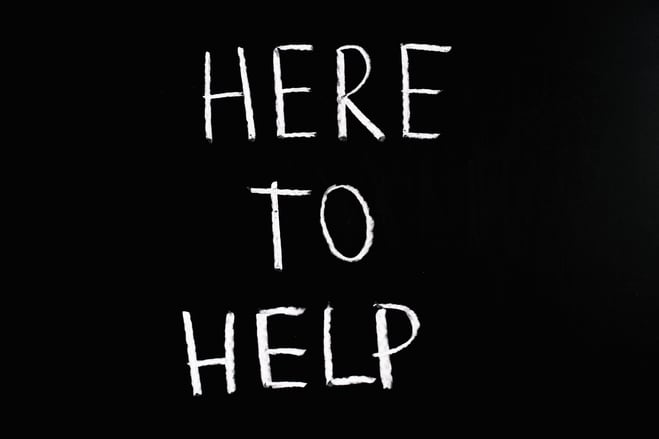Takeaways from TCAs: Optimise Your Experience of Online Events
With online events here to stay for the foreseeable future, Léargas Communications Officer Niamh McClelland chats to Léargas Senior Support and Development Officer Carmel Walsh about what to expect from TCAs and Training Opportunities scheduled for 2021. We also delve into the practicalities of online attendance with Lisa Downes, a Youth Worker at St. Andrews Resource Centre, who has not only attended our online Webinar Wednesday series, but also presented at an online TCA last September.
Among regular attendees, TCAs are synonymous with support, collaboration and guidance. However, for those less used to the acronym, TCAs may be something of a puzzle. Put simply, Transnational Cooperation Activities are events arranged by National Agencies across Europe to share best practices in Erasmus+. Up until 12 months ago, TCAs had been in-person events held both here in Ireland and overseas. They were highly-anticipated gatherings that facilitated networking and encouraged collaboration.
And then came lockdown.
 "TCAs help current beneficiaries enhance the quality of their project."
"TCAs help current beneficiaries enhance the quality of their project."
Like almost everything else, TCAs went digital. Events that were conceived as an opportunity for face-to-face engagement moved online, and attendees found themselves relying on WiFi to tune in. With 'normal life' unlikely to resume for some time, it's safe to say that online events will remain a feature of our lives for the foreseeable future.
With that in mind, Carmel sheds light on the structure of upcoming events and the advantages of online training. Lisa, who has been a youth worker for 13 years, shares her first-hand experience of what's to be gained from tuning into TCAs from home.
Tell Me About TCAs
"For a lot of people in general, TCAs are the first stepping stone into the world of European programmes," Carmel explains. "It’s the first time people get to see what's happening, hear what’s happening, or ask 'What's important about getting connected at a European level?'"
Unlike the regular trainer/trainee dynamic, TCAs prioritise peer-to-peer learning so participants "hear from real-life people [about] how to do it. They get to chat about their experiences in their country, or even [the difference] from county to county. People get to be creative in how they discuss things with each other. It's not just listening to someone teach you in a training course," Carmel added..jpg?width=754&name=pexels-karolina-grabowska-4491461%20(1).jpg) "You're still getting examples of best practices."
"You're still getting examples of best practices."
Sounds fantastic, but is this experience really still possible if you're engaging from behind a computer screen? Well, the simple answer is yes. While the format may be slightly different (more about that later!) and screen fatigue is a genuine obstacle, online TCAs still facilitate information-gathering, encourage collaboration, and act as a 'first-entry point' for so many people.
"It is a little more difficult because you don’t have [people] meeting and chatting over a cup of coffee, but in some ways we’ve found it more of a strength because you're engaging with more people than you would have before," Carmel says. "You'd have people from all across Ireland if it’s a national event or all across Europe otherwise. You're still getting examples of best practices and you’re still learning, but you're at your desk so you don’t have to travel somewhere to get the information."
And while yes, that certainly sounds encouraging, there's no doubt that 11 months of online events have left many of us feeling somewhat drained - something the team at Léargas are all too aware of, and do their utmost to address.
TCAs: The Online Transition
"We try to make it as engaging as possible so you [the participant] feel like you're still being heard and listened to as well," Carmel says, before highlighting the ways the team ensure a productive event for all involved!
"Participants will get material boxes beforehand. They’ll get 'homework' before and after, and there will always be a part where they’ll engage as well through Slack."
A firm advocate for breakout rooms which allow for engagement on a smaller level, Lisa, a youth worker with St. Andrews Resource Centre, believes this TCA feature gives all attendees an opportunity to participate, saying that it facilitates people who "might have a question and don't have the confidence to ask it in the big space."
"To counteract [Zoom] fatigue, all our TCAs are two, or two and half hours max on each day. We’ll have tea breaks, or do the breakout rooms, or [participants] will do activities on their own," Carmel explains. "There are ways to use creative methods, so you’ll get homework to do, or we’ll send resources afterwards to read so you're not just listening for two and a half hours."
.png?width=857&name=Lisa%20Downes(1).png) "It's about staying connected."
"It's about staying connected."
When reflecting on whether peer-to-peer learning has been compromised by the move online, Carmel believes it has actually emerged as a strength, saying: "That’s definitely been really strong."
"In a European context, you listen to people at a European level, [hear] what their experiences are. We did one on Special Education where someone from Denmark spoke about their experiences and did a workshop. So, you're still getting a European dimension at home. In Ireland, with COVID-19, it can feel quite insular. We are an island, but we can still connect with policy and practice at a European level - through sitting at home at your own desk."
"It’s [about] staying connected," Lisa says. "I think that’s the big thing at the moment. We're all very isolated on a European level, local level, every level. It’s keeping the conversation [going] and it’s keeping the doors open."
"It gives you ideas of what others are doing by staying connected," she continues. "Whether people are designing websites, whether people are doing Instagram, whether people are doing creative work with their projects, I think that’s why people should engage with [TCAs]."
TCAs: Does the Story Get Lost Behind the Screen?
Not in Lisa's experience, anyway! Working as a presenting team with a young person who was offering an insight into active engagement and citizenship, Lisa felt that the young person's story ultimately took centre-stage.
"The biggest highlight was to see the young person present, and the reflection opportunity it gave the young person as well, and to share that moment with others, to go through a whole journey," she tells us.
"The young person afterwards was like ‘Wow. What I've done with you guys and what I've done through Erasmus+ really has impacted on my life and where I am now.'"
The two-pronged presenting approach allowed for the discussion of practicalities while ensuring the young person's personal story remained at the forefront of everyone's mind.
"The logistic questions came to me," Lisa says. "How did you apply? How did you recruit? And then the actual very practical [questions] - What did you think of this? How did you get on? How has it impacted you? – went to the young person."
Webinar Wednesdays: Why They Work
While Léargas' Webinar Wednesdays weren't classed as TCAs in 2020, they are in 2021. And from Lisa's perspective, the benefits of attending Webinar Wednesdays are multiple. Wednesday mornings soon became a much-anticipated part of her 2020 weeks.
"We had to do a weekly report for St. Andrews, and one of the things I always said [was] ‘I just really enjoyed Wednesday mornings!'” she laughed.
"Believe it or not, I still use the stuff [from Webinar Wednesdays]," she tells us. "Jamboard; I use that now. Not only with Erasmus+, I use it with my weekly groups. If they don’t feel like they want to talk, there is a tool that they can put post-it notes up, and share their ideas."
Referring to Mentimeter, the voting tool used during Webinar Wednesdays, Lisa highlights the benefits there too: "Young people can vote. What's the next topic? Throw in your ideas, and let’s take a vote on that. I applied it to my own work, because I’d never heard of those things before."
But aside from interactive tools and online supports, Webinar Wednesdays provide participants with a space to discuss challenges and inspire confidence.
"What it was showing was that we all had the same barriers, all the same hurdles, but at the same time, there was a lot of inspiration," Lisa recalls. "People were saying, you know, it’s still achievable... It gave you the confidence to continue."
"It also gave us the opportunity to meet Léargas as well. Although we have a very good relationship with the Léargas team and they're so supportive, but it gave us the feeling ‘they’re actually looking after us as well’. They’re trying to encourage this way of learning, and this way of working. It’s not just being put on the backburner. I really enjoyed the Wednesday mornings, getting on and seeing what was happening."
Feelings of isolation have become common for many of us over the last 11 months, but Lisa found that Webinar Wednesdays helped counteract this for her. "It was a nice opportunity to go beyond the walls, not just of Pearse Street, but beyond the walls of Dublin. It was really nice to reconnect with people and engage with people."
TCAs: Tuning in Throughout 2021
While the subject matter varies, the structure of the TCA schedule is typically based on key priorities for the year.
"Stuff like sustainability, the priorities of Erasmus+, and the European Solidarity Corps, but also what we think we need to do as well," Carmel explains. "You might have things on newcomers, engaging newcomers, or enhancing the quality of current beneficiary skillsets as well."
And just like in 2020, TCAs and Webinar Wednesdays in 2021 will continue to focus on the needs of the beneficiaries; identifying the priorities and establishing the support structures. "All the TCAs have something!"
"All the TCAs have something!"
"The structure we always do online is try to engage beneficiaries with something that is relevant to them; so it’s relevant to their projects or relevant to their work on the ground. Then we can promote how Erasmus+ or Solidarity Corps can support you in this," Carmel explains.
From wellbeing and sexual consent to inclusion and sustainability, Carmel is confident that this year's TCAs will present multiple opportunities for those interested in participating in European programmes, adding: "All the TCAs have something!"
Top Takeaways from Online TCAs
Having been both a TCA attendee and presenter, Lisa is perfectly positioned to offer some words of advice for anyone considering getting involved, saying: "This is all new learning for everybody! Whether it be a presenter or a participant, it doesn’t really matter."
Remember...
- TCAs are an opportunity to maintain connections and network.
- TCAs provide a platform to share your concerns and seek resolutions.
- TCAs allow for the development of new skills.
- TCAs act as a source of both confidence and inspiration.
Want to get involved? For more information on TCAs and Webinar Wednesdays, please contact Carmel Walsh.
Images courtesy of Carmel Walsh and Pexels.
